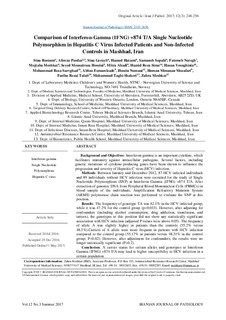| dc.contributor.author | Rostami, Sina | |
| dc.contributor.author | Pasdar, Alireza | |
| dc.contributor.author | Gerayli, Sina | |
| dc.contributor.author | Hatami, Hamed | |
| dc.contributor.author | Sepahi, Samaneh | |
| dc.contributor.author | Nategh, Fatemeh | |
| dc.contributor.author | Meshkat, Mojtaba | |
| dc.contributor.author | Hoseini, Seyed Mousalreza | |
| dc.contributor.author | Ahadi, Mitra | |
| dc.contributor.author | Sima, Hamid Reza | |
| dc.contributor.author | Vosughinia, Hasan | |
| dc.contributor.author | Sarvghad, Mohammad Reza | |
| dc.contributor.author | Esmaeelzade, Abbas | |
| dc.contributor.author | Nomani, Hosein | |
| dc.contributor.author | Mozafari, Homan Mosanan | |
| dc.contributor.author | Talab, Fariba Rezai | |
| dc.contributor.author | Shakeri, Mohammad Taghi | |
| dc.contributor.author | Meshkat, Zahra | |
| dc.date.accessioned | 2020-02-13T07:50:50Z | |
| dc.date.available | 2020-02-13T07:50:50Z | |
| dc.date.created | 2018-01-10T12:25:25Z | |
| dc.date.issued | 2017 | |
| dc.identifier.citation | Iranian Journal of Pathology. 2017, 12 (3), 248-256. | nb_NO |
| dc.identifier.issn | 1735-5303 | |
| dc.identifier.uri | http://hdl.handle.net/11250/2641433 | |
| dc.description.abstract | Background and Objectives: Interferon-gamma is an important cytokine, which facilitates immunity against intracellular pathogens. Several factors, including genetic variations of cytokine-producing genes have been shown to influence the progression and severity of Hepatitis C virus (HCV) infection.
Methods: Between January and December 2012, 87 HCV-infected individuals and 89 individuals without HCV infection were recruited for the study of Single Nucleotide Polymorphism (SNP) at Interferon Gamma (IFNG) +874 T/A. After extraction of genomic DNA from Peripheral Blood Mononuclear Cells (PBMCs) in blood sample of the individuals, Amplification Refractory Mutation System (ARMS) polymerase chain reaction was performed to evaluate the SNP at this position.
Results: The frequency of genotype TA was 62.1% in the HCV-infected group, while it was 47.2% for the control group (p=0.033). However, after adjusting for confounders (including alcohol consumption, drug addiction, transfusion, and tattoos), the genotypes at this position did not show any statistically significant association with HCV infection (adjusted P values were above 0.05). The frequency of allele A was slightly higher in patients than the controls (55.2% versus 48.3%).Carriers of A allele were more frequent in patients with HCV infection compared to the control group (55.17% in patients versus 48.31% in the control group; P=0.02). However, after adjustment for confounders, the results were no longer statistically significant (P=0.2).
Conclusion: A carrier status for certain alleles and genotypes at Interferon Gamma (IFNG) +874 T/A may lead to higher susceptibility to HCV infection in a certain population. | nb_NO |
| dc.language.iso | eng | nb_NO |
| dc.publisher | Iranian Society of Pathology | nb_NO |
| dc.rights | Navngivelse 4.0 Internasjonal | * |
| dc.rights | Navngivelse-Ikkekommersiell 4.0 Internasjonal | * |
| dc.rights.uri | http://creativecommons.org/licenses/by-nc/4.0/deed.no | * |
| dc.title | Comparison of Interferon-Gamma (IFNG) +874 T/A single nucleotide polymorphism in hepatitis C virus infected patients and non-infected controls in Mashhad, Iran | nb_NO |
| dc.type | Journal article | nb_NO |
| dc.type | Peer reviewed | nb_NO |
| dc.description.version | publishedVersion | nb_NO |
| dc.source.pagenumber | 248-256 | nb_NO |
| dc.source.volume | 12 | nb_NO |
| dc.source.journal | Iranian Journal of Pathology | nb_NO |
| dc.source.issue | 3 | nb_NO |
| dc.identifier.cristin | 1539713 | |
| dc.description.localcode | Copyright © 2017, IRANIAN JOURNAL OF PATHOLOGY. This is an open-access article distributed under the terms of the Creative Commons Attribution-noncommercial 4.0 International License which permits copy and redistribute the material just in noncommercial usages, provided the original work is properly cited. | nb_NO |
| cristin.unitcode | 194,65,15,0 | |
| cristin.unitname | Institutt for klinisk og molekylær medisin | |
| cristin.ispublished | true | |
| cristin.fulltext | original | |
| cristin.qualitycode | 1 | |

